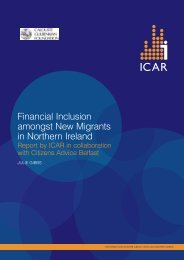Uncovered: assessing media and communications needs ... - ICAR
Uncovered: assessing media and communications needs ... - ICAR
Uncovered: assessing media and communications needs ... - ICAR
- No tags were found...
You also want an ePaper? Increase the reach of your titles
YUMPU automatically turns print PDFs into web optimized ePapers that Google loves.
3.12 Current availability of trainingAs has been noted elsewhere in this report, there is a growing recognition amongst statutory <strong>and</strong> nongovernmentalorganisations of the importance of <strong>media</strong> <strong>and</strong> <strong>communications</strong> in relation to these fourpopulations. However this does not always fi lter through to people at the ‘grass roots’, <strong>and</strong> when itdoes, it is not always seen as a top priority.Priority given to <strong>media</strong> <strong>and</strong> <strong>communications</strong> training tends to relate positively to the size <strong>and</strong>professionalism of the organisation. For example the Anglican, Methodist <strong>and</strong> Roman Catholic churchorganisations have sophisticated <strong>media</strong>/<strong>communications</strong> strategies <strong>and</strong> training programmes. SinceSeptember 11th 2001, Islamic organisations have placed increasing emphasis on the need to developtheir own strategies <strong>and</strong> training.In rural areas, many groups contacted were local branches of national organisations that similarly rantheir own <strong>media</strong> <strong>and</strong> <strong>communications</strong> programmes. In some areas that have received large numbersof new migrants, local authorities, trade unions <strong>and</strong> support organisations have launched initiatives toequip different nationalities to speak <strong>and</strong> communicate for themselves.Infrastructure <strong>and</strong> community organisations supporting refugee <strong>and</strong> migrant worker, isolated rural,some faith <strong>and</strong> BME organisations provide occasional training in this area. However, those sectorsthat organise their own training programmes do not necessarily attach high importance to <strong>media</strong> <strong>and</strong><strong>communications</strong>; indeed, one reported a diffi culty in attracting participants to sign up for this type oftraining.Development agencies, employers’ organisations <strong>and</strong> trades unions are particularly aware of thepolitical, economic <strong>and</strong> social sensitivities around migrants <strong>and</strong> are looking at ways to address them.One way is through <strong>media</strong> awareness training <strong>and</strong> another by developing websites that can be portalsfor information about <strong>and</strong> for different categories or nationalities of migrants. These approaches arealso taking account of the sensitivities <strong>and</strong> attitudes of the host community, focusing on ways ofdefusing community tension <strong>and</strong> exposing myths.Consideration should be given to ways of incorporating <strong>media</strong> <strong>and</strong> <strong>communications</strong> training intobudget proposals, whether organisation-wide or for specifi c projects. One government offi cer pointedout that not long ago organisations had to be persuaded to include a budget for IT support, whereasnow it is generally included without question. If organisations are convinced of the relevance of<strong>communications</strong> to other aspects of their work such as fundraising <strong>and</strong> promotion they might be moreprepared to do this.3.13 Previous training experienceIt is interesting to note that a majority of refugee <strong>and</strong> migrant worker organisations in the survey havereceived <strong>media</strong>/<strong>communications</strong> training given that so few have <strong>communications</strong> strategies or are incontact with their local <strong>media</strong>. As mentioned earlier, this may mean that the training was not useful;it could mean they don’t have the capacity to carry out the tasks recommended to them e.g. staffnumbers or language disadvantage; that it was useful but they had no reason or desire to engagewith the <strong>media</strong>; or the training was poor or inadequate.A similar proportion of isolated rural organisations have undertaken training but appear to havedeveloped better relations with the <strong>media</strong>.The results suggest that BME organisations are more successful at contacting the <strong>media</strong> despitehaving less training in this area. This may be because they have more staff <strong>and</strong> are more likely tohave better language skills than refugees <strong>and</strong> migrant workers. Training targeted at this sector shouldtherefore build on existing knowledge <strong>and</strong> competence.26 <strong>Uncovered</strong>: <strong>assessing</strong> <strong>media</strong> <strong>and</strong> <strong>communications</strong> <strong>needs</strong> <strong>and</strong> capacity of marginalised communities
















